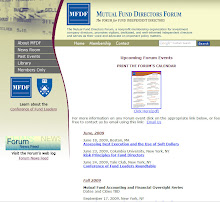According to Chairman Schapiro, "[i]nvestor protection starts with fair and efficient capital markets. The SEC's job is to ensure that these markets are:
- First, structured effectively. This means that customer orders are priced, processed and cleared in an orderly and fair way.
- Second, that they're fed by timely and reliable information. This is imperative whether that information is provided through words or numbers.
- Third, that they're well-served by financial intermediaries and other market professionals. These professionals must be competent, financially capable, and honest.
- And fourth, that they're supported by a strong and focused enforcement arm. Returning to former Chairman Douglas' words, we need to have the "shotgun-behind-the-door … loaded, well-oiled, cleaned, ready for use, but with the hope that it will never have to be used."
[U]ntil we eliminate some of the gaps in regulation (for example, concerning hedge funds and credit default swaps), the market is missing important information and disclosure about these activities.
. . .
[I]n June the Commission will consider whether to enhance disclosure around director nominee experience, qualifications and skills. The current rules only require a very brief description of a candidate's business experience over the past five years. That may not be sufficient in today's complex business environment. I want to make sure that shareholders have the information needed to make sound proxy voting decisions.
. . .
We'll also be considering whether boards should disclose to shareholders their reasons for choosing their particular leadership structure — whether that structure includes an independent chair, a non-independent chair, or a combined CEO/chair.
. . .
The Commission will be considering whether greater disclosure is needed about how a company — and the company's board in particular — manages risks, both generally and in the context of setting compensation. I do not anticipate that we will seek to mandate any particular form of oversight; not only is this really beyond the Commission's traditional disclosure role, but it would suggest that there is a one-size-fits-all approach to risk management." Instead, I have asked our staff to develop a proposal for Commission consideration that looks to providing investors, and the market, with better insight into how each company and each board addresses these vital tasks.In addition to these disclosure changes, chairman Schapiro also announced her intention to look into proxy access.
We are looking at what the Commission considered in both 2003 and 2007; and we're also considering the potential impact of proposed changes to Delaware's corporate law.In the area of regulation of market professionals and intermediaries, Commissioner Schapiro set forth the following priorities, some of which may require legislation to effect:
But it should not surprise anyone in this room that we are viewing these issues with fresh eyes. We want to ensure that any procedural requirements for access are rational, and not a means to thwart effective investor participation.
- Requiring those with custody of client assets to undergo an annual third-party audit, on an unannounced basis, to confirm the safekeeping of those assets.
- Harmonizing the responsibilities of investment advisers and broker-dealers, so that investors who use either can expect a uniform level of professionalism and accountability.
- Mandating that certain investment advisers have third-party compliance audits to ensure their compliance with the law.
- Registering hedge fund advisers, and potentially the hedge funds themselves.
- Requiring more disclosure from credit rating agencies, including potentially the assumptions underlying their methodologies, fees received from issuers, and factors that could change ratings.
- Overseeing more vigorously the credit default swap market, including considering reporting and recordkeeping rules that do not exist today.
- Enhancing the standards applicable to money market funds.
- Providing investors in municipal securities with the same type of disclosure and investor protections as are provided to investors in other securities.
- Enhancing disclosure around asset-backed securities.
Schapiro concluded by pointing out that all the items she has placed on the Commission's immediate agenda "are direct responses to some of the many failures that have led us to this difficult point in time:"
- Proxy access is about making boards more accountable for the risks undertaken by the companies they manage.
- Compensation disclosure is letting a company's owners know how their managers and directors ensure that compensation does not drive inappropriate risk-taking.
- Bolstering oversight of credit rating agencies is about creating a discipline around the ratings process that was notably absent over the past years.
- Money market fund liquidity and quality enhancements are about responding to the possible run-on-the-bank scenario that led the Reserve Fund to "break the buck."
- And greater oversight of hedge funds, credit default swaps and asset-backed securities is about bringing sunshine to shadow markets, ending the practice of regulatory arbitrage.





